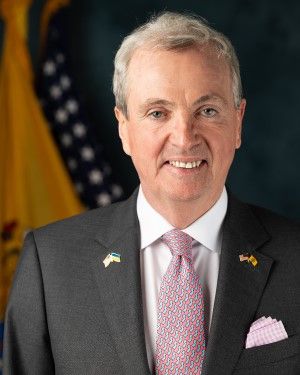- Safety & Recalls
- Regulatory Updates
- Drug Coverage
- COPD
- Cardiovascular
- Obstetrics-Gynecology & Women's Health
- Ophthalmology
- Clinical Pharmacology
- Pediatrics
- Urology
- Pharmacy
- Idiopathic Pulmonary Fibrosis
- Diabetes and Endocrinology
- Allergy, Immunology, and ENT
- Musculoskeletal/Rheumatology
- Respiratory
- Psychiatry and Behavioral Health
- Dermatology
- Oncology
New Jersey Governor Signs PBM, Drug Price Legislation
Governor Phil Murphy has signed three pieces of legislation that would require PBMs to use prescription drug rebates to lower premiums and out-of-pocket costs for consumers and prevent the practice of spread pricing.
Phil Murphy

Three new bills in New Jersey were signed by Governor Phil Murphy that cap some out-of-pocket costs for prescription drugs, establish greater oversight of pharmacy benefit managers (PBMs), and provide transparency across the pharmaceutical supply chain.
“Through greater oversight and increased transparency of the factors that contribute to prescription drug pricing, the state can take meaningful steps to reduce patient costs. Additionally, the department will now require pharmacy benefits managers to meet stringent standards for licensure to prevent practices that can drive up prescription drug costs,” New Jersey Department of Banking and Insurance Acting Commissioner Justin Zimmerman, said in a press release.
The three New Jersey bills include:
- S-1614 – Caps out-of-pocket costs for many residents. This bill extends Medicare’s new $35 a month insulin out-of-pocket cap to state-regulated markets and New Jersey public employee plans. It also caps out-of-pocket costs for EpiPens ($25) and asthma inhalers ($50) for a month’s supply.
- S-1615 – Creates a new data and transparency system within the Division of Consumer Affairs. This bill requires the Division to collect, analyze, and report on drug pricing across the supply chain. The bill also establishes a Drug Affordability Council to formulate legislative and regulatory policy recommendations that help advance the goal of prescription drug affordability and accessibility.
- A-536/2841 – Establishes greater oversight of PBMs. This bill requires rebates to be used to lower premiums and out-of-pocket costs for consumers and prevents the practice of spread pricing, or the difference between what the PBM pays the pharmacy and what it charges insurers. It also requires PBMs to apply for a license from the NJ Department of Banking & Insurance to strengthen regulatory oversight.
This move follows other states that have introduced or passed legislation that offered a variety of laws to require licensing and reporting, prohibit on spread pricing and implement rules that are aimed to make costs more transparent enrollees. Last year, 12 states enacted 19 pieces of legislation that offered a variety of restrictions and requirements for PBMs, according to the National Academy for State Health Policy, a nonpartisan organization that tracks healthcare developments at the state level.
Related: States, not Federal Government, Are Moving to Tighten Regulation of PBMs
To date, all 50 states have passed some type of legislation to regulate PBMs, according to the organization. Many states (43) prohibit gag clauses, which prohibit pharmacists from telling patients about less costly medications. Half of the states require licensing and registration, but only 11 prohibit spread pricing. Additionally, 17 states require PBMs to report rebate or other information to the state and just five require PBMs to report rebates to health plans.
This year so far, the National Academy for State Health Policy is tracking 16 bills in 11 states that address the affordability of prescription drugs. Several of these been signed and enacted. Both Colorado and Minnesota have passed new laws requiring affordability reviews of prescription drugs, but the details are slightly different. A new law in Colorado amends the Prescription Drug Affordability Board law, requiring the board to affordability reviews for drugs with a wholesale acquisition cost (WAC) of $3,000 or more, for drugs whose price increases 200% in the previous 12 months and for biosimilar drugs with an initial WAC that is not at least 15% lower than the reference price.
Minnesota’s law establishes a Prescription Drug Affordability Board (PDAB) and Prescription Drug Affordability Advisory Council (PDAAC). Drugs that will trigger a review include brand name drugs or biologics with a wholesale acquisition cost increase of $3,000 during any 12-month period; brand name drugs or biologics with a WAC of $60,000 or more per year and biosimilars with a WAC that is not at least 20% lower than the reference product.
Payers Recognize the Benefits, but Still See Weight Loss Drugs through a Cost Lens
April 12th 2024Jeffrey Casberg, M.S., R.Ph., a senior vice president of clinical pharmacy at IPD Analytics LLC, a drug intelligence firm that advises payers and pharmaceutical companies, talks about how payers are thinking about weight-loss drugs.
Humira Biosimilars Have a Slow Uptake, Finds Samsung Bioepis Report
April 8th 2024Caps on Medicare Part D cost sharing as a result of the Inflation Reduction Act, could reduce members’ financial incentive for switching to a biosimilar, suggests the newest Samsung Bioepis Quarterly Biosimilar Market Report.
